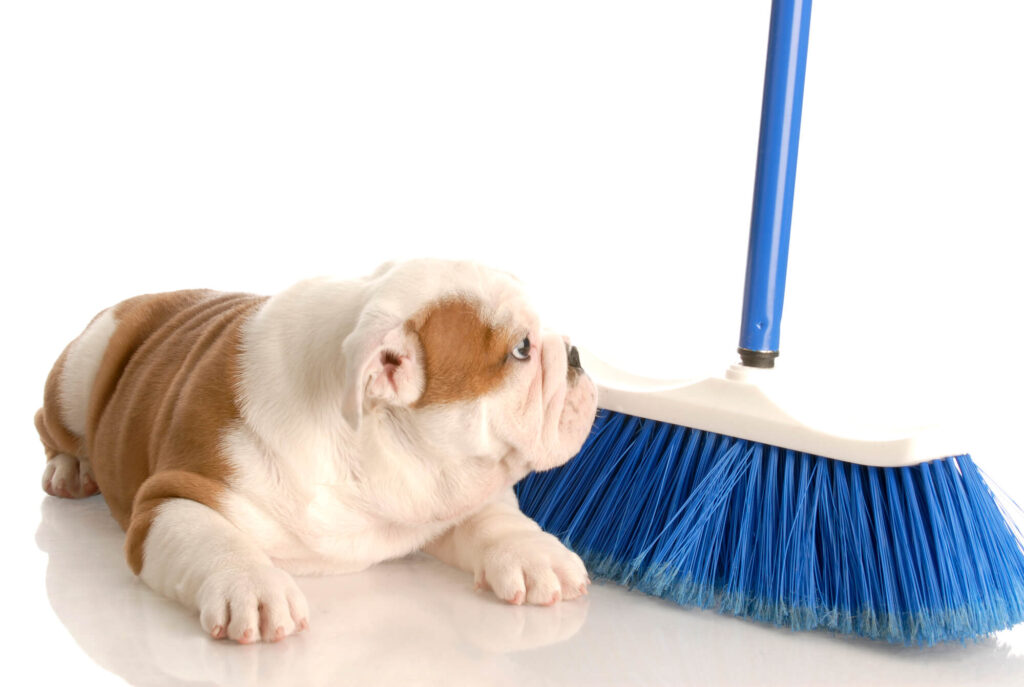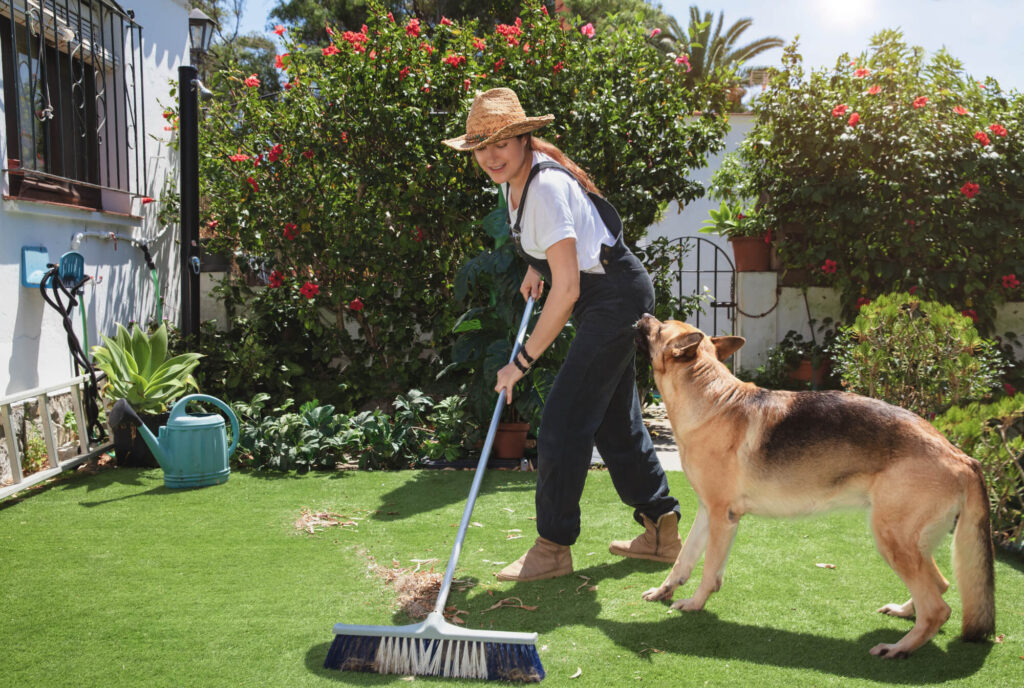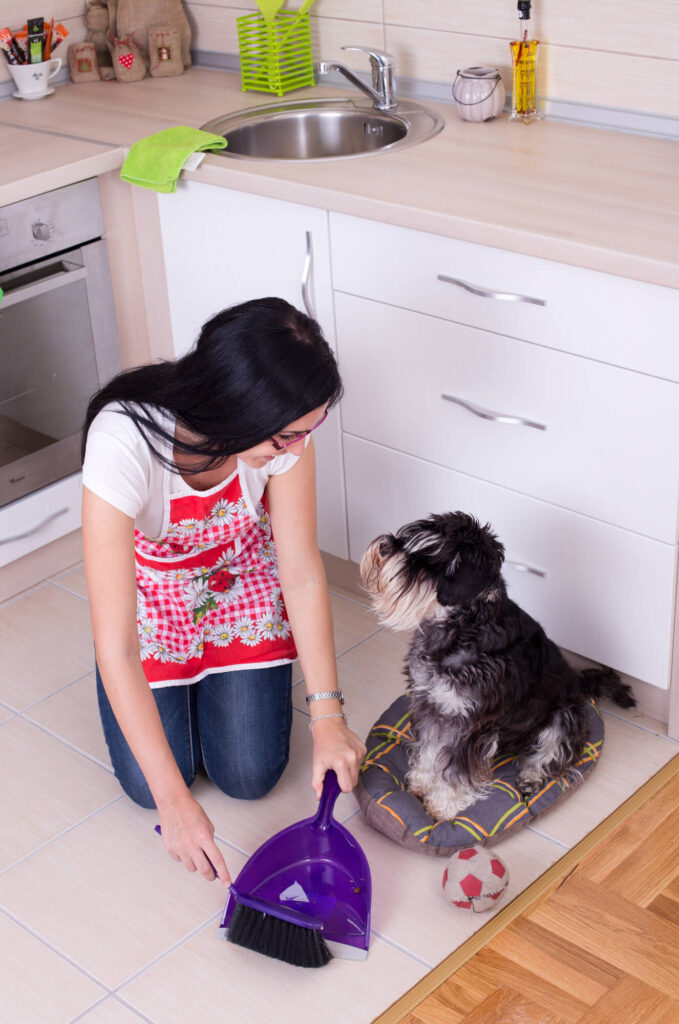12 Surprising Reasons Why Dogs are Scared of Brooms
Does your pup run for cover or start barking at the sight of that bristly menace?
It’s a common occurrence for dog parents – the moment they bring the broom out of the closet, their canine pal suddenly runs away and hides.
From barking to cowering, our four-legged friends seem to think that brooms bring nothing but trouble!
Take our own rescue dog, Leo, for example.
Whenever we bring out the broom to sweep our patio, he scurries off as far away as possible and only ventures back once the chore is finished.
So, if your furry friend trembles at the sight of a broom, then read on because we have compiled 12 possible reasons to answer the question why are dogs scared of brooms?

Why Are Dogs Scared of Brooms?
For canines, the loud sound of a broom, its erratic movements, and its unusual shape can be quite intimidating.
It’s possible that canines might associate brooms with a past negative encounter. Maybe your pup was hit by one, or perhaps somebody shooed them away with it.
Either way, your pooch may now feel anxious and uneasy when they come across this household item.
Let’s delve deeper into each reason so we can fully answer the question: why are dogs afraid of brooms?
12 Reasons Why Dogs Are Scared of Brooms
Dogs are curious creatures and their reactions to brooms are highly individualized. Let’s look at the potential reasons why your pup is not keen on brooms.
1. Lack of Socialization
A lack of socialization can contribute to the fear of brooms. Socializing puppies early on is key when it comes to helping them become accustomed to everyday objects and situations.
Dogs who haven’t been properly socialized may become scared of brooms because they haven’t been exposed to them before or haven’t had a chance to get used to them.
This is why it’s important for owners to take time out to train their puppies so that they don’t develop phobias about everyday objects like brooms or vacuums later on in life.
2. Erratic Movement
The sudden, erratic movements of the broom can be another reason why some dogs are afraid of this household item.
Dogs can perceive these unanticipated movements as potential threats and react accordingly
When a broom is in motion, it can attract the attention of a dog who may become scared if the movement is sudden or otherwise unpredictable.
This fear can be exacerbated in dogs who are already skittish by nature.
Dogs usually don’t attack a stationary broom, but the sudden movements of one in motion can be enough to spook them.
3. Noisy Sound
Another potential explanation for why dogs are afraid of brooms is the noise.
Brooms, when used on hard surfaces such as tile or wood, have the potential to create a loud, startling sound that can scare dogs.
The combination of the noise and the movement of the broom may be enough to make them feel threatened.
Dogs have very sensitive hearing which is why they can also be afraid of flies since the buzzing noise is more bothersome to their sensitive ears.
4. Perceived Threat

Some dogs may also be scared of brooms because they think the object is going after them.
Dogs often interpret humans’ motions as attempts at interaction, whether it be petting or playing fetch; unfortunately, this can lead them to misinterpret common human activities.
When we sweep, your pup may think that the broom is actually “chasing” them.
As a result, your pup may think that the broom is going to attack them and this can cause them to become scared.
Similarly, balloons can also elicit a similar response.
5. Broom in a Different Location
When the broom is placed in a new location or used in a different area of the house, it could frighten some dogs.
Dogs are creatures of habit and can become startled if something is out of the ordinary.
If the broom is usually tucked away in the closet but it was left out in the open, they may become apprehensive.
The stick of a broom is pretty tall, which is especially imposing for small dogs.
Its sudden presence in an unexpected spot can be enough to scare some dogs because they might not recognize it in its new location.
Our Chihuahua, Leo, barks at things out of the ordinary on our walks, like traffic cones and pieces of litter on the ground.
He’s also not a fan of brooms or other tall objects that he can’t identify.
He calms down once he realizes what it is and that it’s not a threat.
Read next: 28 Foolproof Ways to Stop Dogs From Tipping Over Their Water Bowl
6. Previous Negative Experience
Dogs that have had a negative experience with a broom in the past may also be scared of them.
If a dog has been hit or chased with a broom before, they may associate the object with aggression and become fearful of it.
If a scary loud noise occurred near the dog (perhaps thunder or a firework going off nearby), at the same time as the sweeping, they may develop an aversion to all brooms because they will associate it with that loud noise.
It’s important to remember that even if a negative experience occurred months or years ago, the memory may still linger and cause fear when they see a broom again.
7. Confusion
Some dogs may be scared of brooms because they are confused by the object.
We understand what a broom is for, but dogs don’t have this same level of understanding.
Your pup may be curious and try to investigate it, but as soon as they realize that the broom is not a toy and it makes a strange noise when it’s moved, they may become scared and retreat.
8. Anxiety
Anxiety is another possible explanation for why dogs are scared of brooms.
Dogs can become anxious in certain situations, and the presence of a broom may be enough to trigger this anxiety.
This type of fear is often seen in dogs who have experienced traumatic events, such as abuse or abandonment.
Dogs that are anxious about brooms are often nervous about other moving objects like vacuum cleaners or mops.
They may start licking excessively or tremble, pant, whine, or bury their head into you when anxious.
9. Territorial
Dogs who feel overly protective of their space may become scared of a broom as it enters their territory.
They may view the object as a potential threat and might bark excessively or growl to make it go away.
Any perceived danger (the broom) can trigger the instinct to protect their space.
10. Size & Appearance

A broom can be intimidating for dogs due to its long handle and bristled head, especially if it’s a new broom that your dog has never seen before.
It may appear strange or even menacing to a canine, who doesn’t understand what it is used for.
The bristles of the broom can be particularly daunting, as they may appear like fur or porcupine quills to your dog.
The size of the broom can also be overwhelming for small breeds like Chihuahuas, as it towers over them and seems larger than life.
11. Herding Behavior
If you have a herding dog, they may be trying to herd the broom.
Herding is a natural instinct for some breeds like Border Collies and Australian Shepherds.
If your dog is trying to round up the broom, they may become scared if they don’t understand why the erratic broom isn’t responding to their efforts.
This can lead to confusion and a fear of the object.
Read more: Why Do Dogs Headbutt? (Solutions to Prevent It)
12. Genetics
Genetics can also play a factor into why dogs are scared of brooms.
Some dogs have a genetic predisposition to being scared or skittish.
They are more likely to become scared when they encounter something unfamiliar, like a broom, or loud noises like fireworks.
Dogs born to mothers who experienced fear or inadequate nutrition during the pregnancy are more likely to be fearful.
The effects of maternal prenatal stress can influence not only the development of the fetus but also its capacity to cope with fear later on in life.
Stress may provoke changes in brain morphology thus altering the way the fetus will react to potentially frightening stimuli.
This is why it’s important to make sure your puppies get lots of socialization, positive experiences, and good nutrition from an early age to help them be comfortable with new things.
How Do I Get My Dog to Stop Attacking the Broom?
Now that you understand why your dog is scared of brooms, it’s time to think about desensitizing your pup.
Desensitization means gradually introducing a fearful stimulus in a controlled and comfortable setting.
This helps your dog learn to become accustomed to the stimulus (the broom), hopefully leading to a decrease in fear.
1. Exposure

Leave the broom out of the closet, in plain sight of your dog, without any interaction with it.
You can even use a small broom like in the picture above, which will be less intimidating.
This allows them to become used to the broom and understand that it is not a threat.
If you bring the broom out and start to use it right away, your dog may become overwhelmed and scared.
2. Positive Reinforcement
Rewarding your pup with treats and verbal praise when they engage with the broom like looking, sniffing, sitting near it, etc., will help build their trust and reduce anxiety surrounding this object.
Rewarding good behavior is key to helping your dog understand that interacting with the broom can be a pleasant experience and they will get yummy treats for doing so.
3. Introducing Movement
Once your dog is comfortable with the stationary broom, you can start to introduce movement.
Start with sweeping the floor in slow, gentle motions to ensure your pup feels comfortable.
Every time they stay calm and follow instructions, be sure to reward them with treats and offer lots of praise!
You can have your dog sit on a mat or in their crate and watch you sweep.
As you sweep, scatter treats onto the ground to reward them for staying calm and then have them go back to their “spot.”
4. Gradual Exposure
To ensure your pup doesn’t become overwhelmed, training sessions should be brief and frequent – ideally, occurring a few times per week to every day.
This repetition will help them retain the knowledge they have acquired during each lesson.
Make sure not to rush this process and give your dog plenty of time to become comfortable.
5. Be Patient and Consistent
It’s important to be patient and consistent with desensitizing.
It may take some time for your pup to feel comfortable around the broom, so be sure to remain patient and consistent with your training methods.
If your dog reacts to the broom then it may be best to take a break and come back another time.
Keep in mind that this process takes time. Some dogs are a lot more fearful than others and may take longer to desensitize.
6. Hire a Professional Trainer
If your pup’s fear of the broom is severe, and these steps don’t work, it may be best to seek professional help.
A certified trainer can give you specific advice on how to help your pup overcome their fear.
A professional trainer can also develop a plan specifically tailored to your dog.
Some fearful dogs need extra help and guidance.
Summary
It’s important for pet parents to understand the answer to why are dogs scared of brooms; by knowing what causes these reactions we can help our beloved pets feel more comfortable and safe in our homes!
While it can be natural for dogs to be scared of brooms, as an owner you have the power to aid your pup in overcoming this fear through desensitization and rewarding them with positive reinforcement.
FAQ
Why Do Dogs Hate Brooms?
Dogs hate brooms because of a combination of factors, including the noise and sudden movements they make.
If they have had a bad experience with the broom like being chased away, it can lead to an aversion to brooms. Brooms may also intimidate dogs due to their size and shape.
Why Do Dogs Attack Brooms?
Dogs may perceive brooms as a potential threat and feel the need to protect themselves. On the other hand, they could see it merely as an interesting toy — after all, broomsticks look quite similar to regular sticks!
Sudden movements of a broom may set off their prey drive, causing them to jump into action to try to pounce on the broom.
If we find this behavior amusing, we may inadvertently be encouraging it. For example, if we think it’s funny that a new puppy is nipping at a broom, our laughter will encourage them to continue their antics.
If we don’t want our dogs to interact with brooms or other objects in this way, it’s important to redirect or ignore the behavior.
How Can I Tell If My Dog Is Scared?
Scared dogs usually exhibit a number of tell-tale signs, such as cowering, trembling, hiding, freezing in place, lip licking, flattened ears, lowered tail, heavy panting, burying their head into you, or wrapping their paws around you.
They may also become aggressive, submissive, or try to flee. Other behaviors include pacing, urinating, and even snapping.
Related Posts:
- 10 Reasons Why Dogs Are Afraid of Flies
- Why Are Dogs Afraid of Balloons? (+ Helpful Tips)
- Why Does My Dog Bury His Head Into Me?
- 27 Foolproof Ways to Stop Dogs From Tipping Over Their Water Bowl
- 8 Reasons Why Dogs Lick Each Other’s Eyes
- Why Does My Dog Sleep on My Shoes? (12 Reasons)
- Why Does My Dog Lay Down to Eat? (13 Reasons)






